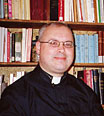 |
|
We quite
often hear liberal Catholics say we must seek dialogue with those
who are in error and not start polemics. In other words, we should
not look at what separates us, but to the truths we have in common.
Truth is so splendid that it will prevail, without us having to
fight against errors. Well, I just came across a press release
from Zenith (dated May 14th last) that reports these views are
held by none other that His Holiness Pope Benedict XVI. The Pope
was explaining how some writings from the so-called “Pseudo-Dionysius”,
a theologian from the 6th century, would be useful to understand
better the nature of “dialogue”. After quoting these
words of the Pseudo-Dionysius: “I would not like to cause
polemics; I simply speak of the truth; I seek the truth,”
the Pope said: “And the light of truth by itself makes error
fade and makes what is good shine. With this principle he purified
Greek thought and related it to the Gospel. (…) This principle,
which he affirms in his seventh letter, is also the expression
of a true spirit of dialogue: It is not about seeking the things
that separate, one must seek the truth in Truth itself; this,
then, shines and causes errors to fall. (…) Precisely when
one enters into the depths of the encounter with Christ, an ample
space for dialogue also opens. When one finds the light of truth,
he realizes that it is a light for everyone; polemics disappear
and it is possible to understand one another, or at least, speak
to one another, draw closer together.”
I found
a few quotes from three encyclicals of Pope Leo XIII that contradict
this opinion, and that explain why Catholics must uncover and
fight energetically against errors, and why it is the duty of
the State to repress them, i.e. to not give them any liberty.
(I.E. The State must only tolerate them when their repression
would cause a greater evil). These traditional texts are in complete
opposition with Vatican II and the modern Popes…
1-“Immortale
Dei”, November 1st, 1885
“The defense of Catholicism, indeed, necessarily demands
that in the profession of doctrines taught by the Church all shall
be of one mind and all steadfast in believing; and care must be
taken never to connive, in any way, at false opinions, never to
withstand them less strenuously than truth allows.” (Paragraph
# 46)
2-“Libertas
Praestantisimum”, June 20th, 1888
“Men have a right freely and prudently to propagate throughout
the State whatsoever things are true and honorable, so that as
many as possible may possess them; but Iying opinions, than which
no mental plague is greater, and vices which corrupt the heart
and moral life should be diligently repressed by public authority,
lest they insidiously work the ruin of the State. The excesses
of an unbridled intellect, which unfailingly end in the oppression
of the untutored multitude, are no less rightly controlled by
the authority of the law than are the injuries inflicted by violence
upon the weak. And this all the more surely, because by far the
greater part of the community is either absolutely unable, or
able only with great difficulty, to escape from illusions and
deceitful subtleties, especially such as flatter the passions.
If unbridled license of speech and of writing be granted to all,
nothing will remain sacred and inviolate; even the highest and
truest mandates of natures, justly held to be the common and noblest
heritage of the human race, will not be spared. Thus, truth being
gradually obscured by darkness, pernicious and manifold error,
as too often happens, will easily prevail.” (Paragraph #
23)
3-Sapientiae
Christianae, January 10th, 1890
“But in this same matter, touching Christian faith, there
are other duties whose exact and religious observance, necessary
at all times in the interests of eternal salvation, become more
especially so in these our days. Amid such reckless and widespread
folly of opinion, it is, as We have said, the office of the Church
to undertake the defense of truth and uproot errors from the mind,
and this charge has to be at all times sacredly observed by her,
seeing that the honor of God and the salvation of men are confided
to her keeping. But, when necessity compels, not those only who
are invested with power of rule are bound to safeguard the integrity
of faith, but, as St. Thomas maintains: ‘Each one is under
obligation to show forth his faith, either to instruct and encourage
others of the faithful, or to repel the attacks of unbelievers.’
(Summa Theologiae, IIa IIae, Q.3, Art. 3, Ad 2) To recoil before
an enemy, or to keep silence when from all sides such clamors
are raised against truth, is the part of a man either devoid of
character or who entertains doubt as to the truth of what he professes
to believe. In both cases such mode of behaving is base and is
insulting to God, and both are incompatible with the salvation
of mankind. This kind of conduct is profitable only to the enemies
of the faith, for nothing emboldens the wicked so greatly as the
lack of courage on the part of the good.” (Paragraph # 14)
What a difference
between these wonderfully clear and enlightening texts of a truly
Catholic spirit, and those of the modern Church, which reek of
sentimentality and naiveté! What a true guidance they are
still providing us with! Truly Catholic Popes were not “dialoguing”
with error, and were not trying to avoid “polemics”.
They recognized how easily it is for the majority of people to
be led astray by error and, consequently, to lose their souls.
Therefore, whenever we hear such nonsense as described in my introduction,
let us remember the words of Pope Leo XIII, and let us answer
back with the truth! ?